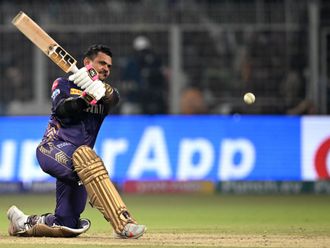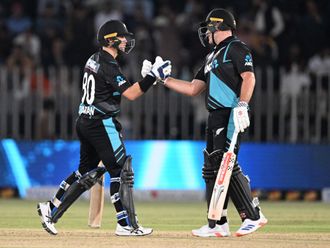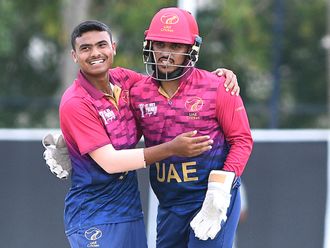Dubai: Pakistan captain Misbah-ul-Haq has meticulously shifted gears, after retiring from one-day cricket, into the final phase of his career following the team’s quarter-final loss in the World Cup.
Quite naturally, the outgoing captain has expressed concern about the future of Pakistan’s cricket and its cricketers, as the baton gets handed over to a new skipper to take over a squad which, according to Misbah, is “not quite up to scratch internationally.”
A lot had been said about Pakistan’s performance in the World Cup, especially in the first two league games. Their capitulation against India and the West Indies was linked to Misbah’s apparent lack of imaginative and effective leadership.
Hardliners (among whom were a few former and notable Pakistan cricketers) had already crucified the national captain. Staring at an almost certain ignominious exit from the competition, Pakistan reasserted themselves with a sequence of successes, which put them into the knockout stage.
The road narrowed thereafter and Pakistan have since bowed out. While there will be much introspection on who the blame for this campaign should be pinned upon, one element must be consistent: Misbah should be exempt from scrutiny because he has provided a template for leadership which should become a reference for budding cricket captains who should ever be entrusted with leading a team whose parts were greater than their sum.
Rising beyond the ordinary has always been Misbah’s brief. He has done this repeatedly in the service of the national team since he assumed the mantle of captaincy in 2010.
His approach to the appointment and to his cricket has always been goal oriented — he could adapt to any condition and situation in the middle — and when the checks and balances are reviewed, Pakistan must concede that he has been rather successful.
When the dust settles down, there can be no bigger pronouncement than that after Pakistan’s glorious World Cup campaign in 1992, no captain, with the exception of Misbah, has been quite so adept in handling the supervision and performance of the national team since Imran Khan.
Pakistan is a virtual cottage industry, producing the most naturally talented cricketers the game has ever seen. Their raw abilities shone through era after era. When they became the finished article, they dazzled the world with their wizardry.
Sadly, the lack of a support structure, proper administration, consistent patronage, long-term vision and failure to introduce cricketers to the essential prerequisites of professional sport has led to a fragile equation through the years between the Pakistan Cricket Board (PCB) and its cricketers — who are their principal equity.
It is through this morass that Misbah rose to be a leader of men. His induction was no less controversial when he took over from his predecessor Salman Butt — who was nailed for match-fixing — during the tour of England in 2010 and is serving a ban from the game which was fastened to a 30-month prison sentence. Mohammad Amir and Mohammad Asif were co-accused with Butt and Pakistan cricket was threatening to implode.
The spotlight was red hot at the time, scalding those who were subjected to post mortem and investigations. The credibility of the PCB and its cricketers was tottering. But Misbah provided the panacea and restored the public’s faith with his unflappable demeanour off the field and his control of proceedings on the pitch.
Pakistan started lifting their attitude, and their game, by winning despite not having the privilege of playing at home since 2009.
Misbah’s tenure has been exceptional. Captaincy in the subcontinent is akin to sleeping on a bed of thorns. There are no friends, only opportunists. Misbah was aware of this and thwarted the pressures with transparency, logic, brevity of word and action, honesty, commitment and performance.
There were instances when he may have felt that the job was a form of corporal punishment, but he seldom let immature actions get precedence over tact and propriety.
Misbah possesses Emotional Intelligence (EI), which could make him a poster boy among human resource specialists. He also has a degree in business administration. Emotional Intelligence, as referred to in a corporate environment manual, is a characteristic which gives an individual the ability to perceive, control and evaluate emotions. It is an attribute which can be strengthened, or is inborn. In Misbah’s case, it was the latter.
Psychologists have often referred to EI as being more important than having an IQ. Misbah has both and he demonstrated this by managing an impulsive administration (who chopped and added players at will) and team — many of whom were grizzly and prickly veterans with strong diverse opinions — by cementing them into a unit where the sum was greater than its parts.
Misbah also contributed with his own skills — in cricketing circles he is known as the master of rebuilding an innings — and masterminded the welfare of his team, with insight and knowledge, against external criticism and examination. He had elevated the performance of his team.
Temperament is what sets Misbah apart. At the age of 40, he kept pushing himself to devise an attack, or carve out a suitable defence for his team when most cricketers of his age had already retired several years ago. He had the mental strength to confront the odds and never appeared to be in a hurry even though he had the handicap of debuting late (he didn’t get a central contract from the PCB till 2007) in international cricket.
Misbah played for Pakistan. He didn’t play with Pakistan and his record bears witness to that.
Perhaps, Misbah’s greatest contribution to Pakistan cricket will come when he walks away from the game and presents the selectors with a dilemma of coming up with a viable alternative for the captaincy.
They will struggle to replace him, because they haven’t laid the foundations to unearth a suitable replacement. That will be the defining moment when Misbah’s legacy is complete.












